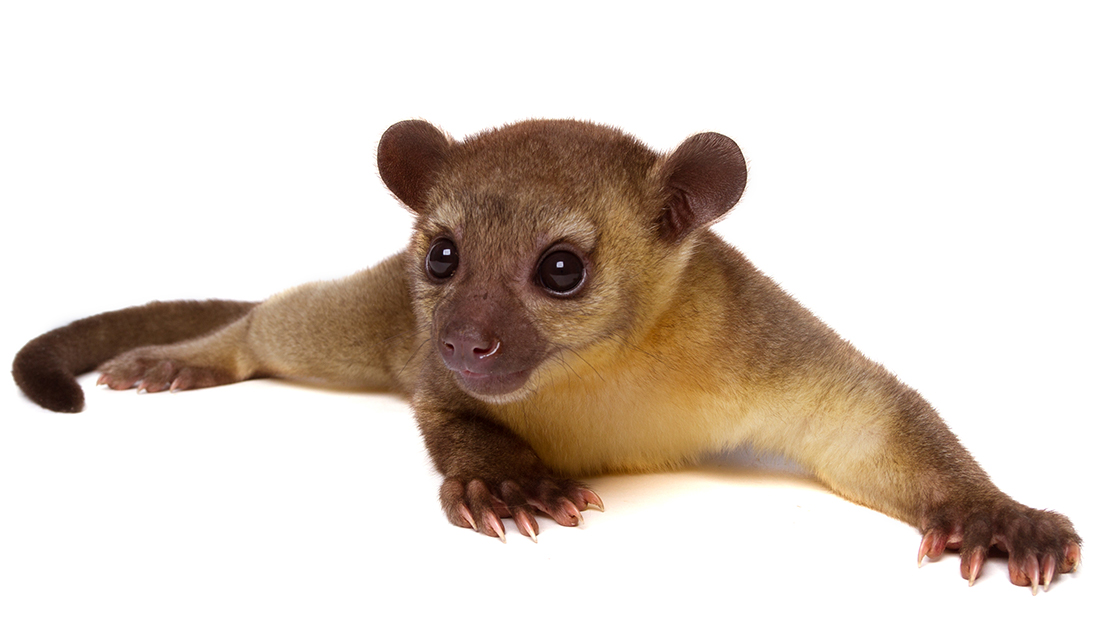
Caring for the Kinkajou
Pet parents who are fond of lively animals will fall in love with the star of this blog-the kinkajou. Kinkajous are cute, cuddly mammals who are often mistaken as monkeys.
When observing a kinkajou’s appearance and behavior, it’s easy to understand how they got their mistaken identities. Like monkeys, kinkajous are curious and energetic. They also like to climb, swing, and hang upside down by their tails. But here’s a fun fact: Not only are kinkajous not monkeys, they’re not even related. In fact, kinkajous are related to racoons!
Kinkajous are small animals with long-life spans. They grow to weigh no more than 10 pounds and live for up to 25 years of age. Given its long-life span, potential owners should consider the commitment to caring for this animal for such a long period of time. And because of its nocturnal nature, owners can expect their kinkajou to become highly alert and active at night.
Nutrition
Kinkajous are affectionally known as honey bears because of their love of sweets. Most of their diet, about 90 percent, consists of fruit, with the remaining amount consisting of insects, leaves, and flowers. The kinkajou’s diet is easy to manage, however, avoid any foods containing artificial sweeteners. Although artificial sweetener is safe for humans, it can be dangerous for animal consumption.
Living Environment
Kinkajous naturally enjoy movement and need spacious living environments to roam and play freely. Ropes, balls, and sandboxes make great additions to a kinkajou’s living environment to encourage their instinctive tendency to play, climb, and hang.
You can create a special play and sleep area for your pet kinkajou with large cages that are at least 6 square feet. To ensure your kinkajou remains socially comfortable, avoid keeping your pet in its cage for overly extended periods of time and give your pet consistent interaction.
Have you ever heard of the terrible twos? Well, that applies to the kinkajou as well. Most pets require some sort of home proofing and this is especially true for the kinkajou as they transition out of their juvenile phase. At about two years-old, they become more curious and mischievous than before. Locking away dangerous, hazardous, or other important is highly recommended.
Vet Care
Your vet will want to see your kinkajou at least annually to:
- Administer updated booster shots
- Check for gum disease and oral health
- Provide general preventative health check-ups
Vaccinations
Distemper, Leptospirosis, and Rabies are usually associated with more mainstream pets like dogs. Kinkajous, however, require the same vaccinations. Kinkajous receive their first round of vaccinations at six weeks, followed by two more rounds at eights weeks, and then 12 weeks of age. After the initial round of vaccinations, Kinkajous should have their booster shots updated annually.
Gum Disease
Kinkajous don’t require routine vet teeth cleanings. Their love of sweets, however, means owners must give their kinkajous the proper tools to fight gum disease and other oral health issues. Papaya, though consisting of sugar, serves as a natural toothbrush for kinkajous. The rough skin of papaya helps rid the teeth and gumline of particles leading to gum disease. If you’re concerned about your kinkajou’s oral health, your vet can give you proper guidance.
General check-ups
The kinkajou’s love of sweets can also lead to obesity and other health complications if the animal becomes sedentary. A general checkup will help your vet determine if your Kinkajou is at risk for obesity related health concerns and provide proper preventative or remediation guidance. The easiest method to prevent obesity related health issues is to encourage your kinkajou to stay active with engagement toys and spaces to roam.
Kinkajous are great pets that require special attention. The right pet parent will surely enjoy this friendly animal and the bond of their companionship. Do you care for a pet kinkajou? Leave a comment to share your favorite kinkajou story or get advice for caring for your kinkajou.

